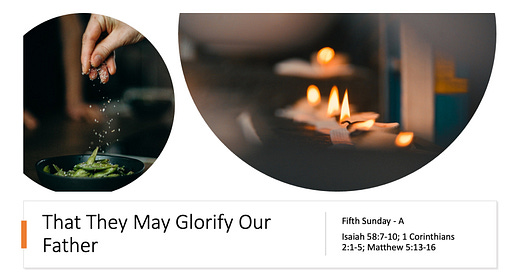The passage from Isaiah in today's liturgy of the word belongs to a discussion about the meaning of true and false fasting. The message of the prophet is surprising. Fasting for us is associated with refraining from food. Some preachers call us to ‘fast’ from the Internet, Facebook or Instagram. But for Isaiah such behavior has nothing to do with true fasting. The fact is that what God wants from us is to bring social justice (Is. 58: 6) and show concern for the poor (Is. 58: 7).
This understanding of fasting is evident in Catholic social teaching. Pope Leo XIII wrote that the Church, in her caring for the soul of man, cannot overlook things that pertain to their earthly life (Rerum Novarum, 42). The words of Saint John Paul II in "Solicitudo Rei Socialis" are strikingly similar to the words of Isaiah: "Those who are more influential because they have a greater share of goods and common services should feel responsible for the weaker and be ready to share with them all they possess" (SRS, 39; Is 58: 7). Pope Benedict XVI reminded us that the service of charity is equal to the service of sacraments and the Word of God (Deus Caritas Est, 22). Finally, Pope Francis states that to solve the present ecological crisis we need to hear both “the cry of the earth and the cry of the poor” (Laudato Si, 49).
Jesus combined two texts of Isaiah in his programmatic sermon at Nazareth (see Luke 4:17-19). The first speaks about preaching the gospel to the poor (Is. 61:1-2) and the second refers to true fasting (Is. 58:6). The theme of liberation, whether from bondage or poverty, runs through both texts. The parable of the Last Judgment also contains a reference to Isaiah's text on fasting. All those placed on the right side of the Son of Man practiced deeds of mercy: they shared bread with the hungry, they took the poor and the homeless to their homes, they clothed the naked and did not turn away from their kin (Is. 58: 7; Matt. 25: 35-36).
Isaiah promises that if we fast in this way, "our light shall shine in the darkness” (Is. 58:10). This statement leads us to today's Gospel. "You are the salt of the earth; you are the light of the world "(Matt. 5:13-14). All four metaphors - the salt of the earth, the light of the world, a city on a hill, and a lamp on a stand - refer to charity. Christianity evangelizes through actions, not mere words, by showing the Spirit and power, not through “plausible words of wisdom” (1 Cor. 2:4). It is our testimony of faith working through love (Gal. 5: 6) that draws others to Christ.
“Let your light shine before others, so that they may see your good works and give glory to your Father who is in heaven" (Matt. 5:16). Our testimony aims to lead others to glorify "our Father." There is a saying: like father, like son. Jesus, the Son of God, revealed the Father to us (John 1:18) and glorified the Father through his life (John 17: 4). He is the light to the upright (Ps. 112: 4; John 8:12). We are also called to be the light for the world. The Father's desire is fasting, which has nothing to do with food, but with social justice and charity. Such life proves the truth of the Gospel, enlightens the darkness of the world, and brings glory to our Father.




